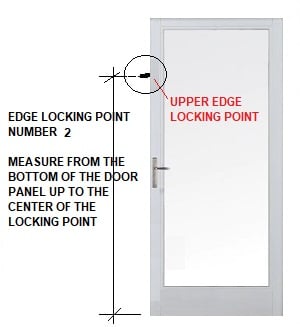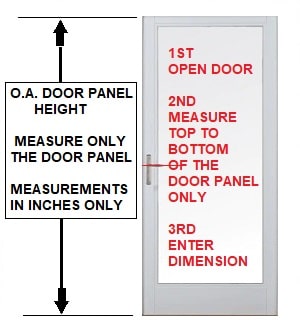Hoppe Automatic Tongue Top Extensions – Select below the appropriate UPPER Tongue Locking Point Location for your door panel height.
Step #1 – Upper Locking Point Location?

Step #2 – O.A Door Panel Height?

Once you know the “Upper Tongue Edge Locking Point” and “Overall Door Panel Height”, You should be able to find the proper Hoppe Automatic Tongue Top Extension below
Hoppe Automatic Tongue Top Extensions,
| Part Number | Lock Part | Upper Locking Point | Extension Length Overall | Top Extension + Gear = Door Panel Height | Roller & Release Trigger Location from bottom of door up, If HH is 36″ ALTERNATE LP #1 |
8778579 |
Top Extension | Tongue | 1045mm – 41 1/8″ | Use For Door Panel Heights Between 71 1/16″ – 78 1/4″ | Roller release trigger @ 42 1/2″ / Upper Tongue lock point @ 64 3/4″ |
8778583 |
Top Extension | Tongue | 1220mm – 48″ | Use For Door Panel Heights Between 71 1/16″ – 85 5/8″ | Roller release trigger @ 42 1/2″ / Upper Tongue lock point @ 72 9/16″ |
8778587 |
Top Extension | Tongue | 1395mm –54 15/16″ | Use For Door Panel Heights Between 79 1/8″ – 92 1/2″ | Roller release trigger @ 42 1/2″ / Upper Tongue lock point @ 80 5/8″ |
8778591 |
Top Extension | Tongue | 1570mm –61 13/16″ | Use For Door Panel Heights Between 79 1/8″ – 99 7/16″ | Roller release trigger @ 42 1/2″ / Upper Tongue lock point @ 86 9/16″ |
8778595 |
Top Extension | Tongue | 1745mm-68 11/16″ | Use For Door Panel Heights Between 88 3/4″ – 106 5/16″ | Roller release trigger @ 42 1/2″ / Upper Tongue lock point @ 86 9/16″ |
8778607 |
Top Extension | Tongue | 2270mm – 89 3/8″ | Use For Door Panel Heights Between 104 1/2″ – 126 15/16″ | Roller release trigger @ 42 1/2″ / Upper Tongue lock point @ 99″ |
One of the most common mistakes customers make when buying a replacement tongue lock is simply by not choosing the correct measurement. If you take a little time and measure the lock correctly, you should be able to find the exact lock that you need. Another mistake that is commonly make is that customers buy a single point lock to repair a broken multipoint lock. This will not work since the 2 lock types are not the same.
A multipoint lock has an internal slide bar that transfers motion onto connected lock extensions while a single point lock does not. A single point lock does not work as a multipoint gearbox replacement. Below are some indications that your lock may have internal parts that are broken.
-
Door is stuck or jammed and cannot be opened
-
Lever handle is sagging or drooping and not returning to the horizontal rest position after the door has been opened.
-
Lock seems to be stripped when opening the door. internal gear teeth are slipping and not disengaging the lock points.
-
Lock makes a crunchy noise when opening or locking the door.
-
Unable to activate the deadbolt after lifting up on the handle.